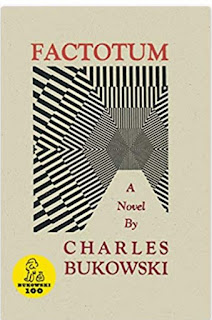Factotum
I’m not sure that I would have sought out this book, but it was one the only one I was interested in from the few available in a small bookshop in the town of Crest, in the Drome region of France. It’s a curious book to have in stock when you have only a handful of works in English, and I wonder if I hadn’t bought it how long the book would have stayed on the shelf. Having said this, there are a few trendy types around Crest, so perhaps it would have been picked up by a Dutch hipster in search of 70s American cred. This is all to say, without saying much, that Charles Bukowski’s writing is for the sort of reader who wants something alternative to the mainstream, because that is what is celebrated in the novel – the same code of honour possessed by the beat poets to deliberately provoke and shock brain-dead urban workers and the powers-that-be (employers, politicians, police officers, parents). In a different reading, it’s about the spirit of American individualism, and the ability to stand on your own two feet. It’s the art of being a bum, but doing it from the perspective of one possessed of a not-very-useful college degree; standing with and apart from the ordinary workers who are there without the choice shown by the ‘beats’. It’s also about alcoholism, taking a very carefree attitude to employment, and living by the seat of your pants (and losing your pants frequently to various women, not always the most desirable types).
The
writing is crisp – simply said, in short scenes, with evident humour, plenty
of it self-deprecating in nature for the protagonist, Henry Chinaski. Chinaski
travels the country, staying in cheap boarding houses and alternating between
employment and the other side; living alone and with a woman (he appears to be
more or less worse off in company) and promising much to employers but
inevitably being let go, usually because he ignores some protocol or another,
or refuses to ‘play the game’ with the demeaning tasks asked of him. It’s not
giving away much to say that the book ends in a second rate strip club where
Chinaski describes, rather poetically, an aging performer’s serious attempt to
seduce an audience for her own benefit, and the beautiful last line for a
novel: ‘And I couldn’t get it up.’
Bukowski
has a strong reputation, and yet he is not Ginsburg or Burrows or Kerouac, all
of whom were published in the 1950s and pushed various literary boundaries
further. The cover of my edition makes a rather bold claim that ‘Not since
George Orwell has the condition of being down-and-out been so well recorded’ – which
places the novel into a different genre. Or attempts to do so. There is a bit
of Hemingway here in the scenes-style and omissions, and perhaps it is true that like Orwell the
writer is quite deliberately taking aim at the limitations of the social
contract. But it’s also lighter than these writers, more whimsical, more
matter-of-fact. So, although I wouldn’t have sought it out, I did enjoy the
novel, read in France in more fortunate circumstances than the narrator faces,
or Bukowski himself lived through in the young days when he wished to be a
writer but first had to drift, and live.




Comments
Post a Comment